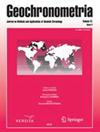青藏高原东北部塔里塔力哈遗址诺木红文化陶瓷的发光测年
IF 0.9
4区 地球科学
Q3 Earth and Planetary Sciences
引用次数: 4
摘要
摘要作为一种日常用具和手工艺品,陶瓷在考古遗址的存在是人类活动的直接证据。虽然在青藏高原的许多遗址都发现了陶瓷,但大多数都是使用传统方法进行老化的,如对相关木炭和骨骼进行类型学或放射性碳年代测定。本文采用石英和钾长石OSL测定了柴达木盆地塔里塔哈5种砂调灰陶瓷的年代。陶瓷OSL年龄的可靠性是使用来自同一文化层的六个独立的放射性碳样品,三个木炭和三块骨头来确定的。在Talitaliha遗址的砂质黄土沉积物上测定了六个额外的OSL年龄,以提供陶瓷年龄的上限和下限。陶瓷发光测年结果与14C年龄吻合良好,且在地层OSL年龄的限制范围内,表明陶瓷OSL测年在QTP的考古研究中具有巨大的潜力。Talitaliha矿场的确定年龄范围在3400–2800卡BP之间;这与柴达木盆地其他地区的诺木红文化非常吻合,其范围在3400–2450卡BP之间。本文章由计算机程序翻译,如有差异,请以英文原文为准。
Luminescence Dating of Nuomuhong Culture Ceramics at Talitaliha Site on the Northeastern Qinghai-Tibetan Plateau
Abstract As a daily utensil and artefact, the presence of ceramic at an archaeological site is direct evidence of human activity. While ceramics have been found at numerous sites on the Qinghai-Tibetan Plateau (QTP), most have been aged using conventional methods such as typology or radio-carbon dating of associated charcoal and bone. In this study, five sand-tempered grey ceramics from Talitaliha in the Qaidam Basin were dated using quartz and K-feldspar OSL. The reliability of the ceramic OSL ages was determined using six independent radiocarbon samples, three charcoal and three bone, from the same cultural layer. Six additional OSL ages were determined on sandy loess sediments at the Talitaliha site to provide upper and lower limits for the ceramic ages. The ceramic luminescence dating results are in good agreement with the 14C ages and are within the constraints of the stratigraphic OSL ages, suggesting that OSL dating of ceramics has great potential for archaeological research on the QTP. The determined age range for the Talitaliha site was between 3400–2800 cal BP; this fits well with Nuomuhong culture dates from other locations in the Qaidam Basin that range between 3400–2450 cal BP.
求助全文
通过发布文献求助,成功后即可免费获取论文全文。
去求助
来源期刊

Geochronometria
地学-地球科学综合
CiteScore
2.20
自引率
0.00%
发文量
1
审稿时长
>12 weeks
期刊介绍:
Geochronometria is aimed at integrating scientists developing different methods of absolute chronology and using them in different fields of earth and other natural sciences and archaeology. The methods in use are e.g. radiocarbon, stable isotopes, isotopes of natural decay series, optically stimulated luminescence, thermoluminescence, EPR/ESR, dendrochronology, varve chronology. The journal publishes papers that are devoted to developing the dating methods as well as studies concentrating on their applications in geology, palaeoclimatology, palaeobiology, palaeohydrology, geocgraphy and archaeology etc.
 求助内容:
求助内容: 应助结果提醒方式:
应助结果提醒方式:


